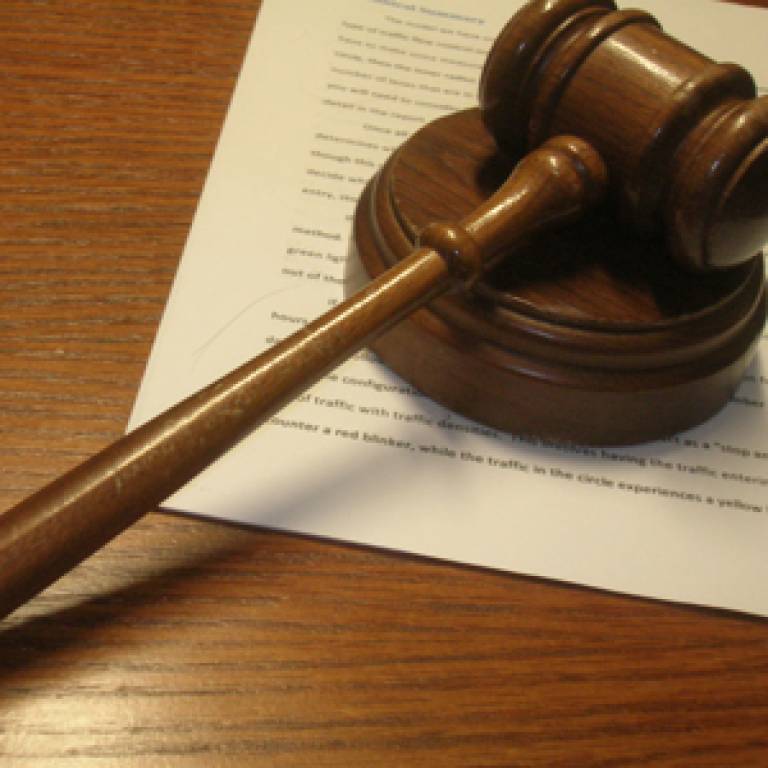Almost a quarter of jurors confused about rules on internet use during a trial
15 May 2013
Almost a quarter of jurors (23%) are unclear about the rules surrounding internet use during a trial, according to preliminary research led by Professor Cheryl Thomas (UCL Laws).

Among jurors who misunderstand the rule on internet use, 16% believe they cannot use the internet at all, even to check their own emails, while serving on a jury; five per cent believe there is no restriction at all on their use of the internet during a trial; and two per cent believe they can look for information about their case during the trial as long as it does not influence their judgment.
"These
findings show that the vast majority of jurors understand and follow the rules
on how jurors can use new media during trials but the message is not getting
through and is confusing to a significant minority of jurors," said lead author Professor Cheryl Thomas (UCL Laws).
"In order to minimise juror contempt in the new media age, jurors must understand the rules on improper conduct, know how and when to report improper conduct when they see it and they should be able to do so with ease. If we ignore these critical factors, then we run the risk of creating the ideal conditions for a perfect storm of juror contempt."
The study, published in Criminal Law Review, a Thomson Reuters journal, follows a number of cases in recent years involving jurors' inappropriate use of the internet, which have led to a number of juries being discharged, or trials abandoned. Two cases have resulted in prosecutions and convictions of jurors for contempt.
"We run the risk of creating the ideal conditions for a perfect storm of juror contempt."
Professor Cheryl Thomas
The team that led the research is urging the Law Commission to base any recommendations for reform of contempt of court in England and Wales on reliable, empirical evidence.
"Ensuring
that trial by jury can effectively operate in the new media age requires
empirical evidence about what jurors do, what they think and what the best
tools to provide them with are to do their job to the best of their ability.
Contrary to popular belief, this kind of research can legally be conducted with
real juries in this country, and that is precisely what the UCL Jury Project is
doing," said Professor Thomas.
The research findings reported in the Criminal Law Review are from the first stage of a four-stage research project working with real juries at Crown Courts in England and Wales. The Stage 1 findings provide the first empirical evidence in this country on: juror understanding of the rules on contempt, awareness of recent prosecutions of jurors, willingness to report improper conduct and desire for guidance on conducting deliberations and written directions on the law from the judge.
Other key findings from Stage 1 include:
- Only very small proportions of jurors said they used the internet in ways that could be legally problematic: six per cent looked up information about legal terms used in the case; one per cent visited the crime scene on Google Earth, Streetview or other internet sites; one per cent looked up information about parties to the case.
- In terms of social media, three per cent of jurors shared their experience of jury service on social networking sites such as Facebook and Twitter, and one per cent blogged or chatted online about doing jury service.
- Almost all jurors (82%) said they would have liked more information on conducting deliberations.
- Two aspects of deliberations where jurors feel they need more guidance are crucial elements in ensuring proper deliberations and preventing juror contempt: what to do if jurors are confused about a legal issue (49%) and what to do if something goes wrong during deliberations (35%).
- Among jurors that received written directions, every single juror (100%) said they found them helpful. Among jurors that did not receive written directions, 85% said they would have found them helpful
- Jurors are less likely to report instances of fellow jurors misusing new media than other behaviour such as potential jury tampering and bullying in the deliberating room because they feel uncomfortable reporting this.
The research was conducted with juries at Crown Courts between 2012-13 and builds on previous work conducted by the UCL Jury project, as part of the 2010 study Are Juries Fair?. The research is funded by the Economic and Social Research Council and has been conducted with cooperation from the Judiciary of England and Wales, Her Majesty's Courts and Tribunals Service and Ministry of Justice.
Image: Gavel by Brian Turner
Media contact: Rosie Waldron
Links
UCL Jury Project briefing notes
The research paper via UCL Discovery
Professor Cheryl Thomas
UCL Laws
 Close
Close

